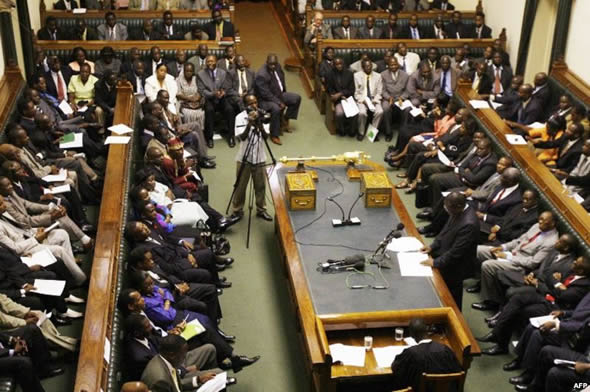
PARLIAMENT is too broke to re-open its constituency information centres countrywide clerk of Parliament Austin Zvoma has said.
NQOBANI NDLOVU STAFF REPORTER
Parliament Constituency Information Centres (PCICs) are a source of information on Parliament business as parliamentary publications like the Hansard can be accessed from them.
They also provide an avenue for parliamentarians and the electorate to meet and discuss constituency issues.
PCICs were established during the Fifth Parliament between 2000 and 2005 and were shut down just before the July 31 elections, leaving hundreds of people who were manning them jobless.
Zvoma told Southern Eye yesterday that there was currently no money to open the PCICs.
“We have no money and they will only be reopened when financial resources are available,” Zvoma said in a telephone interview.
Parliament owes several service providers like hotels millions of dollars which accumulated during the tenure of the Seventh Parliament.
- Chamisa under fire over US$120K donation
- Mavhunga puts DeMbare into Chibuku quarterfinals
- Pension funds bet on Cabora Bassa oilfields
- Councils defy govt fire tender directive
Keep Reading
Some current and former legislators are owed sums ranging from $10 000 to $20 000 each in unpaid parliamentary sittings.
Some legislators and analysts who spoke to Southern Eye, expressed sadness over the failure by Parliament to reopen the PCICs which they described as essential.
“They were very essential and strategic meeting points for sitting legislators and members of the constituency,” Pumula MDC-T legislator Albert Mhlanga said yesterday.
“We have met as MPs and agreed to reopen the centres and fund their operations from our pockets because we can’t wish them away.”
Nkayi South MDC-T legislator Abednico Bhebhe added: “They are a vital source of information, especially on Parliament business.
The PCICs gave every member of the constituency a chance to be heard on many issues since they could come in to either meet the sitting legislator or to deliver their concerns on anything in the suggestions boxes there.”
Rodrick Fayayo, the co-ordinator of the Bulawayo Progressive Residents’ Association, weighed in saying the offices played a crucial role for residents, especially when Parliament is sitting and legislators are in Harare.
“Those offices are neutral venues where even those who cannot approach the MP at home can safely go and lay their grievances,” Fayayo said.
“In the absence of offices, MPs might use their homes and in that scenario they become accessible to friends and relatives only.
“Those in the constituency who don’t agree with an MP might find it difficult to go to individual (MPs)’s homes,” Fayayo added.










